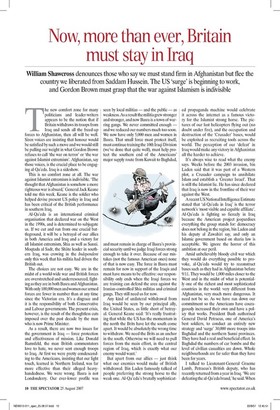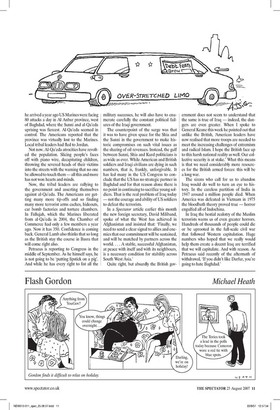Now, more than ever, Britain must stay in Iraq
William Shawcross denounces those who say we must stand firm in Afghanistan but flee the country we liberated from Saddam Hussein. The US 'surge' is beginning to work, and Gordon Brown must grasp that the war against Islamism is indivisible The new comfort zone for many politicians and leader-writers appears to be the notion that if Britain withdraws its troops from Iraq and sends all the freed-up forces to Afghanistan, then all will be well. Siren voices are insisting that honour would be satisfied by such a move and we would still be pulling our weight in what Gordon Brown refuses to call `the war on terror' or `the war against Islamist extremism' Afghanistan, say those voices, is the crucial place to be engaging al-Qa'eda. Iraq is a sideshow.
This is no comfort zone at all. The war against Islamist extremism is indivisible. 'The thought that Afghanistan is somehow a more righteous war is absurd,' General Jack Keane told me this week. Keane is the soldier who helped devise present US policy in Iraq and has been critical of the British performance in southern Iraq.
Al-Qa'eda is an international criminal organisation that declared war on the West in the 1990s, and is determined to subjugate us. If we cut and run from one crucial battleground, it will be a betrayal of our allies in both America and Iraq and a victory for all Islamist extremism, Shia as well as Sunni. Moqtada al Sadr, the Shiite leader in southern Iraq, was crowing in the Independent only this week that his militia had driven the British out.
The choices are not easy. We are in the midst of a world-wide war and British forces are overstretched and underresourced, fighting as they are in both Basra and Afghanistan. With only 100,000 men and women our armed forces are fewer in number than at any time since the Victorian era. It's a disgrace and it is the responsibility of both Conservative and Labour governments. The present crisis, however, is the result of the thoughtless cuts imposed over the past decade by the man who is now Prime Minister As a result, there are now two issues for the government in Iraq — force protection and effectiveness of mission. Like Donald Rumsfeld, the man British commentators love to hate, we never sent enough troops to Iraq. At first we were pretty condescending to the Americans, insisting that our light touch, learned in Northern Ireland, was far more effective than their alleged heavyhandedness. We were wrong. Basra is not Londonderry. Our ever-lower profile was seen by local militias — and the public — as weakness. As a result the militia grew stronger and stronger, and now Basra is a town of warring gangs. We never committed enough — and we reduced our numbers much too soon. We now have only 5,000 men and women in Basra. That small force must protect itself, must continue training the 10th Iraqi Division (we've done that quite well), must help protect the southern end of the Americans' major supply route from Kuwait to Baghdad, and must remain in charge of Basra's provincial security until we judge Iraqi forces strong enough to take it over. Because of our mistakes (not the famous American ones) none of that is now easy. The force in Basra must remain for now in support of the Iraqis and must have means to be effective: our responsibility only ends when the Iraqi forces we are training can defend the area against the Iranian-controlled Shia militias and criminal gangs. They still need us for now.
Any kind of unilateral withdrawal from Iraq would be seen by our principal ally, the United States, as little short of betrayal. General Keane said: 'It's really frustrating that while the US has the momentum in the north the Brits have let the south come apart. It would be absolutely the wrong time to withdraw. We need the Brits as an anchor in the south. Otherwise we will need to pull forces from the main effort, in the central region of Iraq, which is exactly what our enemy would want.'
But apart from our allies — just think what our enemies would make of British withdrawal. Bin Laden famously talked of people preferring the strong horse to the weak one. Al-Qa'eda's brutally sophisticated propaganda machine would celebrate it across the internet as a famous victory for the Islamist strong horse. The pictures of our last helicopters flying out (no doubt under fire), and the occupation and destruction of the 'Crusader' bases, would be exploited as recruiting tools across the world. The perception of our 'defeat' in Iraq would make any victory in Afghanistan all the harder to achieve.
It's always wise to read what the enemy says. Weeks before the 2003 invasion, bin Laden said that it was part of a Western plot, a Crusader campaign to annihilate Islam and establish a 'Greater Israel'. That is still the Islamist lie. He has since declared that Iraq is now in the frontline of their war against the West.
A recent US National Intelligence Estimate stated that `al-Qa'eda in Iraq' is the terror network's 'most visible and capable affiliate'. Al-Qa'eda is fighting so fiercely in Iraq because the American project jeopardises everything the group stands for: democracy does not belong in the region, bin Laden and his deputy al Zawahiri say, and only an Islamic government based on sharia law is acceptable. We ignore the horror of this ambition at our peril.
Amid unbelievably bloody civil war which they would do everything possible to provoke, al-Qa'eda would try to reconstruct bases such as they had in Afghanistan before 9/11. They would be 1,000 miles closer to the West and in the midst of what is potentially one of the richest and most sophisticated countries in the world: very different from Afghanistan, very much more dangerous. It need not be so. As we have run down our commitment so the Americans have courageously increased their own and have a policy that works. President Bush authorised General David Petraeus, one of America's best soldiers, to conduct an entirely new strategy and 'surge' 30,000 more troops into Baghdad and the northern Sunni provinces. They have had a real and beneficial effect. In Baghdad the numbers of car bombs and the level of civilian casualties are down. Whole neighbourhoods are far safer than they have been for years.
I talked to Lieutenant-General Graeme Lamb, Petraeus's British deputy, who has recently returned from a year in Iraq. 'We are defeating the al-Qa'eda brand,' he said. When he arrived a year ago US Marines were facing 80 attacks a day in Al Anbar province, west of Baghdad, where the Sunni and al-Qa'eda uprising was fiercest. Al-Qa'eda seemed in control. The Americans reported that the province was virtually lost to the Marines. Local tribal leaders had fled to Jordan.
Not now. Al-Qa'eda atrocities have revolted the population. Slicing people's faces off with piano wire, decapitating children, throwing the severed heads of their victims into the streets with the warning that no one be allowed to touch them — all this and more has not won hearts and minds.
Now, the tribal leaders are rallying to the government and asserting themselves against al-Qa'eda. The Americans are getting many more tip-offs and so finding many more terrorist arms caches, hideouts, car bomb factories and torture chambers. In Fallujah, which the Marines liberated from al-Qa'eda in 2004, the Chamber of Commerce had only a few members a year ago. Now it has 350. Confidence is coming back. General Lamb also thinks that so long as the British stay the course in Basra that will come right also.
Petraeus is reporting to Congress in the middle of September. As he himself says, he is not going to be 'putting lipstick on a pig'. And while he has every right to list all the military successes, he will also have to enumerate carefully the constant political failures of the Iraqi government.
The counterpoint of the surge was that it was to have given space for the Shia and the Sunni in the government to make historic compromises on such vital issues as the sharing of oil revenues. Instead, the gulf between Sunni, Shia and Kurd politicians is as wide as ever. While American and British soldiers and Iraqi civilians are dying in such numbers, that is, frankly, unforgivable. It has led many in the US Congress to conclude that the US has no strategic partner in Baghdad and for that reason alone there is no point in continuing to sacrifice young soldiers. That is the real problem of Iraq today — not the courage and ability of US soldiers to defeat the terrorists.
In a Spectator article earlier this month the new foreign secretary, David Miliband, spoke of what the West has achieved in Afghanistan and insisted that: 'Finally, we need to send a clear signal to allies and enemies that our commitment will be sustained, and will be matched by partners across the world. . . . A stable, successful Afghanistan, at peace with itself and with its neighbours, is a necessary condition for stability across South West Asia.'
Quite right, but absurdly the British government does not seem to understand that the same is true of Iraq — indeed, the dangers are even greater. When I spoke to General Keane this week he pointed out that unlike the British, 'American leaders have now realised that more troops are needed to meet the increasing challenges of extremism and radical Islam. I hope the British face up to this harsh national reality as well. Our collective security is at stake.' What this means is that we need considerably more resources for the British armed forces: this will be a long war.
The sirens who call for us to abandon Iraq would do well to turn an eye to history. In the careless partition of India in 1947 around a million people died. When America was defeated in Vietnam in 1975 the bloodbath theory proved true — horror engulfed all of Indochina.
In Iraq the bestial zealotry of the Muslim terrorists warns us of even greater horrors. Hundreds of thousands of people could die or be uprooted in the full-scale civil war that followed Western capitulation. Huge numbers who hoped that we really would help them create a decent Iraq are terrified that we will capitulate. And with reason. As Petraeus said recently of the aftermath of withdrawal, 'If you didn't like Darfur, you're going to hate Baghdad.'










































 Previous page
Previous page